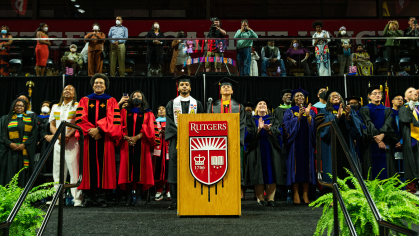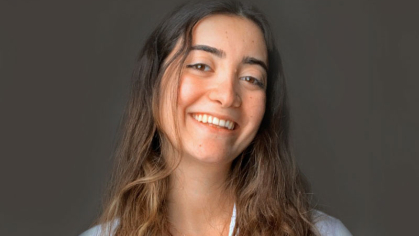Douglass Senior Spurred to Activism to Promote Diversity, Equity and Inclusion at Rutgers

Dominique Hazel-Criss never considered herself an activist, though she always knew she wanted to make a change in the world. Then came the deaths of George Floyd, Breonna Taylor and Ahmaud Arbery. That’s when Hazel-Criss, who will receive an undergraduate degree in political science and journalism with a minor in philosophy from Rutgers-New Brunswick and begin law school at Temple University in the fall, decided that her future career needed to deal with social justice and civil rights.
“Issues of diversity, equity and inclusion are present everywhere in our lives and if we do not acknowledge them, we continue to support and enable a system meant to oppress,” she said.
Born in Essex County, Hazel-Criss moved to Somerset when she was 10 and always considered Rutgers an obvious college choice. She did not anticipate the journey Rutgers would take her through, from joining the Douglass Residential College community as a Diversity, Equity and Inclusion (DEI) ambassador to shaping her future goal to become a civil rights attorney.
“When I first came to Rutgers, I thought I was going to be a journalist. So, I started my first year taking mainly journalism classes, but once I started to branch out into subject areas that were interesting to me, I found a whole new love for political science and the social justice initiative,” said Hazel-Criss.
Hazel-Criss became a DEI ambassador her junior year, when Black Lives Matter and the racial reckoning led millions of people throughout the world into the streets to protest. That summer was also the first time Hazel-Criss spoke at a rally on racial injustice in New Jersey.
In her work as a student ambassador, Hazel-Criss's goal was to build a more informed student community as well as helping to improve the student experience at the university by advocating for more diverse faculty, more diverse areas of study and promoting events and organizations on campus doing the work to make a space for everyone on campus.

“Part of the job is making sure students are doing their due diligence in keeping up with the prominent issues happening on campus but also making sure students have an active voice in decisions that ultimately affect them and the learning environment they are in. It may not always be the most glamorous job, but it is still an important one. We must keep pushing the goal line further,” she said.
Hazel-Criss is also the event coordinator of Rutgers University Black Law Student Association and has been involved in several organizations focused on social justice and equity. Through the BOLD Center, Hazel-Criss found a Douglass alumna who is a practicing attorney to mentor her as she starts her journey in the legal field. She credits hearing a speech by activist Rosa Clemente during a conference through the Diversity, Equity,and Inclusion Committee at Douglass as the inspiration that led her to making civil rights work part of a future career.
“Rosa Clemente has been an activist for so long and she's done so many impactful things. Her discussion about being an activist first was the key point that set off a Eureka moment for me,” said Hazel-Criss. “She helped me refocus and make it truly clear what my angle was: social justice. That moment changed everything for me.”
While she intends to practice law, Hazel-Criss also wants to impact social justice in other ways. Utilizing the journalism portion of her education, Hazel-Criss also plans to contribute written pieces and other forms of media to inform the social justice movement and help push forward initiatives that can create a huge public impact.
“Practicing law can be impactful, but the best way to get a message across is to deliver it in diverse ways. Contributing to documentaries or to written discourse may reach someone who may not have heard that message otherwise. You have to learn before you teach, so it is important to engage with all to create a positive change. Not everyone needs a lawyer for everything. Sometimes you just need to hear an unfamiliar perspective,” said Hazel-Criss.
Reflecting on her Rutgers journey, Hazel-Criss credits the many diverse experiences during her time on campus to building the woman she is now. “I have learned so much from my fellow ambassadors. It is our diverse backgrounds, life experiences, interests and hardships that make us unique individuals with so much knowledge to provide to the community,” she said. “As we are learning to be better educators, we are also learning how to better advocate for ourselves. I look back on that with a sense of pride. To be able to give the voiceless a voice fills me with immense joy.”


